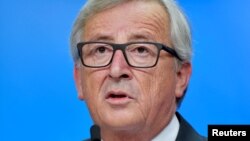A top European Union official warned Turkey on Tuesday that its crackdown on political opponents and the media go against EU values and give the impression that it no longer wants to join the bloc.
“I note with bitterness, I who am a friend of Turkey, that Turkey is distancing itself from Europe every day,” the president of the EU's executive Commission, Jean-Claude Juncker, said.
Juncker's comments follow a week that saw 10 lawmakers from Turkey's pro-Kurdish party and nine senior staff members of the opposition Cumhuriyet newspaper arrested on alleged links to terror groups. Access to social media websites and applications also were restricted, a move seen as a bid by the government to prevent protests from being organized.
Juncker called on Turkish President Recep Tayyip Erdogan to immediately say “whether Turkey really wants to be - yes or no - a member of the European Union.”
He also said Erdogan would only have himself to blame if the EU does not grant visa-free travel in Europe to Turkish citizens soon.
The visa waiver is part of a package of incentives, including fast-tracked membership talks and billions of euros for Syrian refugees in Turkey, promised to Ankara if it helps prevent mass migration to the continent.
“Mr. Erdogan will have to explain to the Turkish people why they will not be able to freely travel like all other Europeans throughout Europe, because it will be he who has not fulfilled the conditions agreed in advance,” Juncker said.
His criticism comes just as the EU is set to release its latest progress report on Turkey's membership negotiations, on Wednesday.
Turkey's Foreign Ministry branded the EU criticism as “unacceptable.” In a statement, the ministry accused European nations of “insistently refusing to understand Turkey's sensitivities concerning terrorism.” One of the conditions for the waiving of visas is that Turkey must change its definition of “terrorism” to prevent the arrests of journalists and political opponents.
The ministry also faulted the EU for failing to press the outlawed Kurdistan Workers' Party, or PKK, to lay down its arms.
Both Turkey and the EU consider the PKK a terror organization, yet alleged PKK militants were allowed to roam freely in EU countries and to engage in anti-Turkish propaganda inside the European Parliament building, according to the statement.
“The EU has lost its plausibility and credibility with the Turkish people on the issue of the struggle against terrorism,” the statement said.
Turkey has been in talks to join the European Union since October 2005, but progress has been held up, often by political opposition and particularly due to resistance from Cyprus.
The Mediterranean island has been divided in two since 1974, when Turkish troops occupied its northern third.
But other EU countries also are opposed to the large, relatively poor and mainly Muslim country joining. Germany, notably, would prefer an alternate kind of “privileged partnership” for Turkey.
The tenuous state of Turkey's future in the EU was reflected Tuesday in the remarks of a senior German official who pointed Turks who feel politically persecuted to the possibility of seeking asylum in Germany.
Deputy Foreign Minister Michael Roth expressed the government's solidarity with “all critical spirits in Turkey” in Tuesday's edition of daily newspaper Die Welt. He added that Germany “is in principle open to all politically persecuted people. They can apply for asylum in Germany.”
However, German Chancellor Angela Merkel said the priority is ensuring that no one needs to do so. Merkel also stressed that asylum applications are considered by independent institutions, not her government.
“We are working politically for a situation in Turkey that doesn't make it necessary for people to seek asylum,” she said.
Merkel added that “we have received alarming signals in recent days” and Germany would continue pushing for Turkey to respect fundamental freedoms.
Speaking in the European Parliament in Brussels Tuesday, Peoples' Democratic Party (HDP) parliamentarian Ertugrul Kurkcu called for action, not just words of condemnation.
“We are at a critical moment,” he warned, adding that “a very dark atmosphere of oppression” reigns over Turkey.




